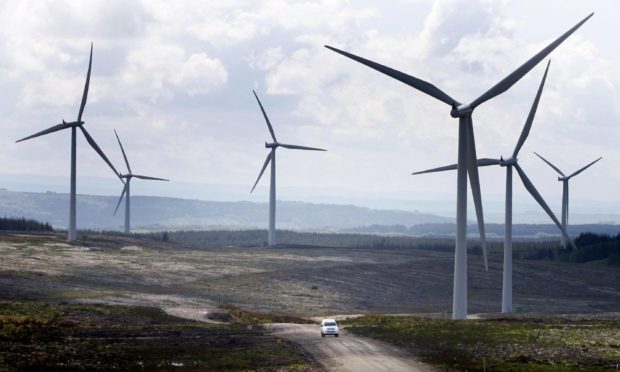Concerns over “radar safety” are adding to blocks in the construction of the Kenly windfarm.
North East Fife MP Wendy Chamberlain tabled a debate at the House of Commons on Tuesday to try and end the impasse, which has seen a halt on development of the St Andrews University-owned site for the last eight years.
Scotland’s top-rated institution wants to erect six large wind turbines on land south-east of the town, as part of efforts to reach net zero emissions by 2035.
Despite having permission to go ahead since 2013, an objection by the Ministry of Defence over concerns of its closeness to Leuchars airfield — Army operated but still in use — and possible radar interference has seen it halted.
Net zero ambition praised
Minister of state Jeremy Quin agreed to organise another meeting between the MoD and St Andrews University, but explained the MoD refused to take the risk the turbines could be mistaken for unidentified aircraft or produce “radar clutter”.
He said: “The unfortunate fact about this project is it is just eight miles from Leuchars Station.
“That is why in 2011, the MoD was involved in the initial planning process and undertook an assessment. The findings were clear, the turbines as they stood would cause an unacceptable impact on air-traffic control radar.
“We cannot afford to take a risk which could put lives at risk.
“We did not rule out the proposal. The project could go ahead as long as they provided a radar mitigation scheme before the turbines were erected.”
He added: “I don’t think it is fair to say the MoD is not responsive, we have continued to engage and I recall a proposal was made for a holographic radar…I don’t believe that was progressed by the developer.”
MoD “declined” to meet with university
St Andrews Quaestor and factor Derek Watson said: “We are grateful to Wendy Chamberlain for raising the issue of Kenly wind farm with the UK Government.
“St Andrews University is committed to ambitious plans to be carbon net zero by 2035.
“The university has planning permission to build a wind farm consisting of 6 x 2 megawatt wind turbines at Kenly. We had the support of the Ministry of Defence in applying for the consent.
“We did recognise the risk and cleared this with them in advance.
“However, a strict condition of that permission is that construction can only start once agreement has been reached with the MoD over a solution to ensure the turbines do not interfere with the radar systems at Leuchars.
“Despite numerous, repeated and high-level attempts by the University to explore solutions with the MoD, the ministry has consistently declined to engage and refuses to negotiate to find a way forward, even although technical solutions are available and already in use elsewhere. We can only speculate as to why the MoD will not engage with us, even although the UK Parliament declared a climate emergency more than two years ago.
“The wind farm at Kenly would save 7,500 tonnes of carbon per year, enable the University to comply with its duty under the Climate Change (Scotland) Act 2009, secure energy pricing into the future freeing up funding for world-class teaching and research and enable the St Andrews to become self-sufficient for electrical energy.
“The biomass plant at Eden Campus, extensive use of solar technology and Kenly are essential elements in achieving that aim.”
After the debate, Ms Chamberlain said: “St Andrews University’s commitment to reaching net zero by 2035 and it’s wider community engagement on this ambition should be praised and supported by government.
“Instead, eight years after planning permission was originally granted for Kenly wind farm, work is yet to start as a result of the MoD’s refusal to engage with them in mitigation measures in relation to Leuchars airfield.
“My debate called for a better, more transparent process within the MoD – not just for Kenly but for all similar projects across the UK. I look forward to our meeting with the Minister to continue this conversation.
“In the year the UK has hosted the G7 and will be leading at COP-26 it is right that all UK and Scottish government departments are making all possible efforts to tackle the climate crisis including the shift to green energy.”

